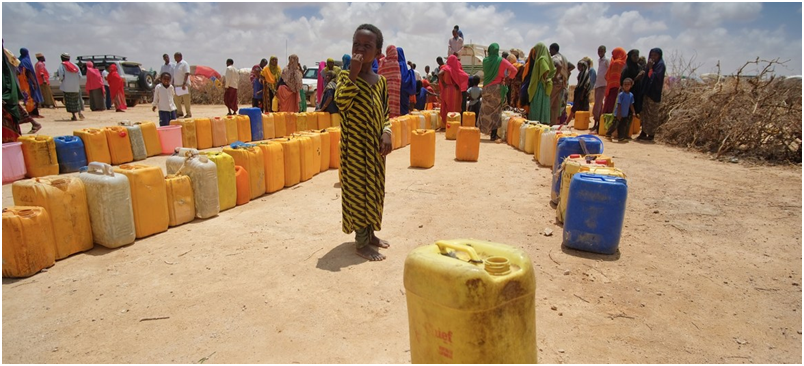The world’s largest crime prevention and criminal justice gathering has rejected “the divisions and inequalities” exposed by COVID-19.
Ghada Waly, Executive Director of the UN Office on Drugs and Crime (UNODC) and Secretary-General of the 14th Congress on Crime Prevention and Criminal Justice says ‘’we have strengthened “crime prevention and criminal justice to address the urgent needs of today as well as the challenges of tomorrow…to leave no one behind.”
This is coming as poor rain forecast for the next few months is threatening to exacerbate the plight of tens of thousands of Somalis displaced from their homes and villages due to “extreme” water shortages since last November.
Spokesperson for the UN Office for Coordination of Humanitarian Affairs (OCHA), Jens Laerke, said that pre-drought conditions have already been reported in parts of Somaliland, Puntland, Hirshabelle, Galmudug and Jubaland regions of the Horn of Africa country after the poor seasonal rains late last year.
“The loss of rain-fed pasture is threatening the survival of livestock which is the foundation of many Somalis’ livelihoods. Displaced people have told [us] that they are moving in search of water and pasture for their animals”, he added.
An estimated 2.7 million people in Somalia, including about 840,000 children aged under five, are at risk of “crisis level” of food insecurity “or worse”, between April and June – the main rainy season in the country, Laerke added.
“That is an increase of more than 65 per cent compared to current levels. Water shortages will also increase the risk of disease outbreaks.”
He went on to note that humanitarian organizations are delivering water to some 300,000 people in affected areas, and $13 million has been released from the Somalia Humanitarian Fund to step up response efforts.
A rapid response allocation of $7 million from the Central Emergency Response Fund (CERF) is also on its way, and up to $20 million will be released to fund anticipatory action in Somalia, the OCHA spokesperson added.
Somalia has been plagued by a complex, multi-layered humanitarian crisis for decades, further complicated by conflict, climate shocks, disease outbreaks and weak social protection mechanisms. Since last year, Desert Locust infestations and the COVID-19 pandemic have added to the challenges.
In 2021, an estimated 5.9 million people across Somalia – including 15 per cent women and 66 per cent children – are expected to require humanitarian support.
UN and humanitarian partners aim to reach about 4 million vulnerable people with life-saving assistance through the year, for which they require about $1.09 billion. However, only 2.5 percent of that amount has been secured so far.
The appeal responds to humanitarian programmes across eight emergency clusters, spanning education, food security and livelihoods, health, logistics, non-food items (NFIs) and emergency shelter, nutrition, protection, and water, sanitation and hygiene (WASH).
In the mean time, organised with UNODC support, a record-setting 152 Member States, 114 non-governmental organisations, 37 intergovernmental organizations, 600 individual experts, and other UN entities, also called for stronger international partnerships to achieve the Sustainable Development Goals (SDGs) and build a more just world.
At the start of the Congress on Sunday, member states adopted the Kyoto Declaration, under which governments agreed to concrete actions to address crime prevention, criminal justice, rule of law concerns, and international cooperation.
Member states will take those commitments forward in May at the 30th session of the Commission on Crime Prevention and Criminal Justice in Vienna.
“Our pledge to achieve the Sustainable Development Goals is now crystallized into the Kyoto Declaration”, Congress President, Japanese Minister of Justice Yoko Kamikawa told participants.
Calling the Declaration “not a goal but a starting point”, she underscored that it was time to act: “our next step is to implement it to realise just, peaceful and inclusive societies”.
Ms. Waly upheld that the Kyoto Declaration “acknowledges the increasingly transnational, organized and complex nature of crime and the urgent need to adapt and renew support, most of all to developing countries, to enhance capacities of law enforcement and criminal justice institutions and enable international cooperation”.
Improving security
Over six days the participants discussed how to advance crime prevention and criminal justice, promote the rule of law and achieve the SDGs, which the President said had become even more important as “the fabric of societies was fraying” with COVID-19 disproportionately affecting the most vulnerable.
On the sidelines, dozens of special events and meetings hosted on the hybrid event platform covered a range of topics from tackling wildlife crime to the impact of COVID-19 in prison settings and children associated with terrorist and violent extremist groups.
Since its inception 65 years ago, the Congress “continues to bring together diverse stakeholders…because, to fight crime, seek justice, and promote the rule of law, no stakeholder can succeed alone”, said the Japanese justice minister.
She stressed that now was the time for solidarity, saying “it is time to strengthen multi-stakeholder partnerships to build just, peaceful and inclusive societies in our post-COVID-19 world”.
The pandemic had prompted the General Assembly to postpone the Congress from its original date last April.
“Working from Kyoto, Vienna and New York, separated by geography and time zones but united in spirit, the able staff of UNOV and UNODC have proved once again that the UN remains open for business, to deliver for the people who need us”, said Ms. Waly.
The 15th UN Crime Congress is scheduled to take place in 2025.







